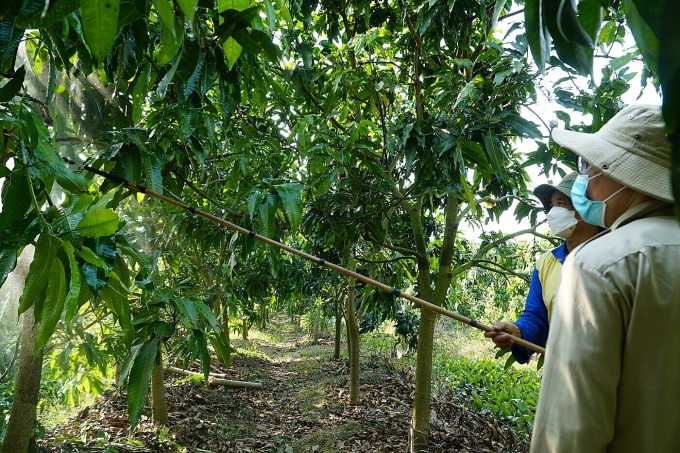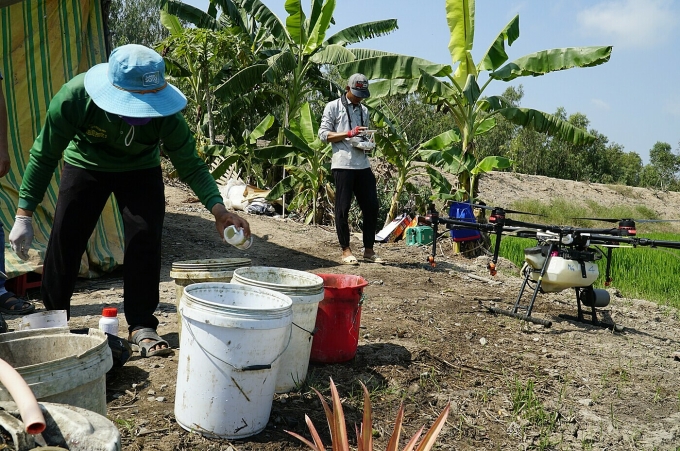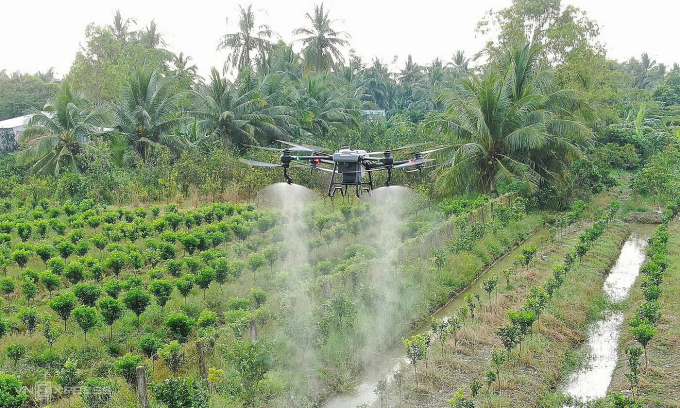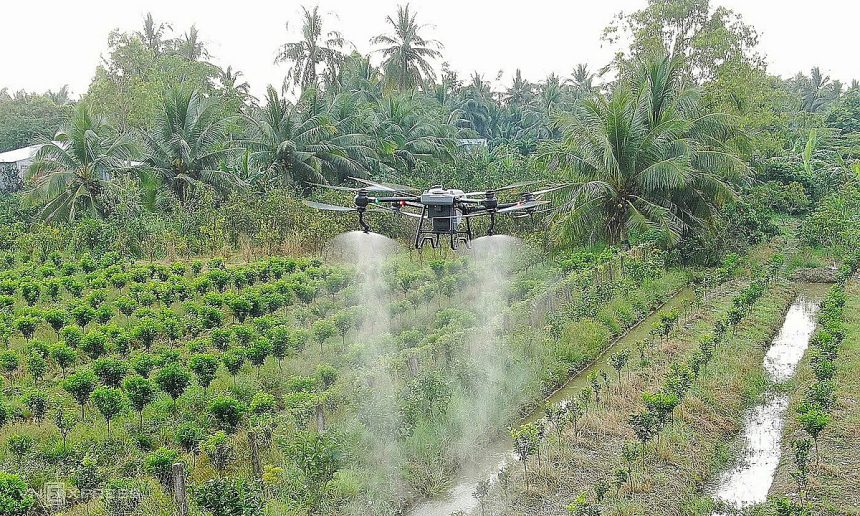Running after productivity, using chemical drugs to eradicate pests, diseases that cause ecological imbalance, insects that are harmful to drugs, farmers have to spray more, according to experts.
Nearly 30 years of mango cultivation in Dong Thap, Mr. Tran Minh Loc said that previously the tree flowered, naturally fruiting. But to increase productivity, currently lasting 4-6 months, he had to spray 15-18 times, including stimulant, left and except for pests.
“The most difficult to treat is thrips. Spraying continuously but they are still inert. If not spray is considered to be lost,” Mr. Loc said. Particularly for pesticides, he had to change continuously because this insect was resistant to the drug. Each time spraying, the cost is about one million VND/ha, particularly the fertilizer accounts for 50% of the production cost.

Mr. Loc sprayed on the mango. Image: Ngoc Tai
The same situation takes place on rice. Mr. Tran Van is, also in Dong Thap, said that each rice crop lasted for 3 months, he had to spray 7-8 times to treat all kinds of pests such as yellow snail, brown planthopper, blast, onion mosquitoes … There were five pests and diseases, low rice prices, not enough to pay for fertilizer.
“The pests are now harder to treat than before, especially brown planthoppers.
For durian, the number of spraying more, can be calculated by week. Just quit once, pests bite all the young buds, making the flower cycle more slow for months.
Currently, Vietnam has 1,918 active ingredients with 4,844 commercial names that are pesticides allowed to use, increase 98 active ingredients and 309 drugs compared to 2023. In which, pesticides, except for the remaining 80% are herbicides and preservatives.
According to the Plant Protection Department, the total amount of plant protection drugs used annually at about 100,000 tons, or an average of 3.8 kg per hectare in 2020, tending to decrease to 3.2 kg per ha in 2023.

Farmers mixed with plane on rice fields. Image: Ngoc Tai
Dr. Ho Van Chien, former Director of the Southern Plant Protection Center, said that the farmer himself “created conditions” for pests and drugs. “They sprayed not for crop safety but … peace of mind,” he said.
According to Mr. Chien, growers often prefer chemical drugs with high toxicity, seeing dying immediately to rest assured. On the contrary, they are afraid of biological drugs because of their slow effects, although safe and protected by natural enemies. As a result, the ecosystem was broken, harmful insects evolved, more resistant to drugs.
He led the research that brown planthoppers could produce 65 generations each year. In the 56th generation, they resisted the active ingredient Buprofezin 3,600 times. In 2017, a survey of the Southern Plant Protection Center in Tien Giang showed that the 6th -generation brown planthopper resistant to Nitenepram was 180 times higher and there was no sign of stopping.
“Spraying throughout, using a removal to use a drug is the best way for pests … evolution,” Mr. Chien said.
Assoc. Good green, thick planting leads to more pests and diseases. To protect the plants, it must be sprayed – a difficult loop to escape.
“If you want to have productivity, it costs money, more and more pests spray,” Mr. Chau said.

Drone sprayed in the fruit gardens in Ca Mau. Image: Wish Ly
He thinks that organic cultivation, environmental protection is an indispensable direction. Experts lead Malaysian farmers to grow durian, do not use fertilizer, low productivity but high price because of guaranteed quality. They only collect fruit when ripe naturally shed, creating confidence for consumers.
Similarly, in Japan, people are willing to pay 10 USD for a domestic red mango, but not interested in imported goods cost only $ 1 – although the form is not different.
“Durian Ri 6 and many indigenous fruit trees of Vietnam are very delicious, there is no shortage of consumers who accept to pay high prices to enjoy. I need to be clean and safer to promote the domestic market,” Mr. Chau shared.
According to experts, in order to reduce chemical drug dependence, Vietnam needs to apply an ecological farming model such as enhancing enemies, protecting useful insects such as parasitic bees and turtles; synchronous cultivation, dodging planpers; Avoid using a continuous drug; Biological priority is more effective but sustainable and environmentally friendly …
Ngoc Tai



